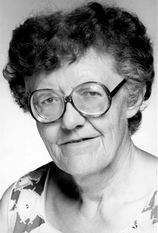Barbara Ball facts for kids
Quick facts for kids
Barbara Ball
|
|
|---|---|
 |
|
| Born |
Barbara Bertha Ball
13 June 1924 |
| Died | 13 March 2011 (aged 86) St. George's, Bermuda
|
| Nationality | British |
| Occupation | physician, trade union administrator, civil rights activist |
| Years active | 1949–2005 |
| Known for | championing self-determination and voting rights for black Bermudians |
Barbara Ball (13 June 1924 – 13 March 2011) was an important doctor, politician, and activist from Bermuda. She was the first woman doctor to work in Bermuda. She treated all patients, no matter their race, which was very unusual in the 1950s when segregation was common.
Barbara Ball strongly believed in equal rights. She fought for the civil rights of black Bermudians. She also served in the Parliament of Bermuda and helped workers through the Bermuda Industrial Union. In 1963, she spoke at the United Nations about the unfair treatment of black workers in Bermuda. She was honored in 2000 for her work.
Contents
Growing Up in Bermuda
Barbara Bertha Ball was born in Bermuda on June 13, 1924. Her mother was Bermudian, and her father was an English carpenter. Barbara had a younger brother named Walter.
She went to the all-white Bermuda High School for Girls. After high school, she won a scholarship from the government to study medicine. In 1942, she started studying at Liverpool University in England. She also learned judo there. She finished her medical degree seven years later.
A Doctor for Everyone
After finishing her studies, Barbara Ball worked as a doctor in hospitals in England for five years. In 1954, she came back to Bermuda. She joined a medical group called Bermuda Medical Associates. She was the first Bermudian woman to become a doctor.
Dr. Ball quickly became known for treating all patients equally, no matter their race. This was a big deal because of segregation. The other doctors at her practice asked her to leave because of her actions. So, she opened her own small office and kept treating everyone.
She also taught judo classes in the evenings. When police warned her not to teach black Bermudians, she started her own judo club. This club was one of the first places in Bermuda where people of all races could play sports together.
Fighting for Fairness
In 1959, during the Bermuda Theatre Boycott, Barbara Ball publicly supported black Bermudians. They were trying to get equal rights. She knew that many of her black patients struggled to pay for medical care. She believed that everyone should have good health, no matter how much money they had.
The next year, she spoke at a public meeting. She supported the idea that all adults should be able to vote when they turned 21. At that time, only people who owned property could vote. She believed that wealth should be shared more fairly in society. Her strong support for black people and workers caused some disagreements with her church. She then changed her religion from Anglican to Catholic.
Leading the Workers' Union
In 1961, Barbara Ball joined the Bermuda Industrial Union (BIU). This union was created in 1946 to help working-class people, most of whom were black and couldn't vote. By 1962, she became the General Secretary of the BIU.
In 1963, Ball and Walton Brown went to a United Nations meeting about colonialism. She explained that racism in Bermuda meant black Bermudians didn't have equal chances. She pushed for Bermuda to govern itself. British representatives did not agree with this idea.
Barbara Ball's work with the union made some white people dislike her. They thought she was being disloyal. In 1964, she lost her ability to admit patients to King Edward VII Memorial Hospital. She was also removed from her roles as choir mistress and organist at her church.
In 1965, during a workers' strike at the Bermuda Electrical Light Company (BELCO), Ball was involved. She used her judo skills to avoid being taken by the police. She was accused of causing trouble, but she was found not guilty in court.
Under Ball's leadership, the BIU grew a lot. More construction workers and hotel workers joined the union. After her court case, the BIU became the biggest union in Bermuda.
A Voice in Parliament
In 1968 and again in 1972, Barbara Ball was elected to the House of Assembly of Bermuda. She represented the Progressive Labour Party. The 1968 election was the first general election in Bermuda after everyone gained the right to vote.
She stepped down as General Secretary of the BIU in 1974. However, she continued to help with negotiations for better pay and benefits for workers. These benefits included pensions, insurance, and paid time off for maternity and sick leave. She kept doing this work until 2005. In 2000, she was honored as an officer in the Order of the British Empire for her important contributions.
Remembering Barbara Ball
Barbara Ball passed away on March 13, 2011, in St. George's, Bermuda. Many important politicians and union leaders attended her funeral. She was buried in St Paul's Anglican Cemetery.
She is remembered as a pioneering doctor in Bermuda. But her biggest impact was her fight for the civil rights of black Bermudians. The government created the Dr. Barbara Ball Public Health Scholarship to honor her. Ottiwell Simmons, who worked with Ball at the BIU, wrote a book about her life called Our Lady of Labour in 2010.
See also
 In Spanish: Barbara Ball para niños
In Spanish: Barbara Ball para niños
 | John T. Biggers |
 | Thomas Blackshear |
 | Mark Bradford |
 | Beverly Buchanan |

